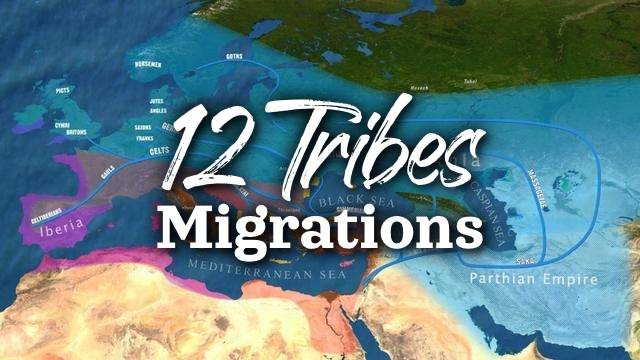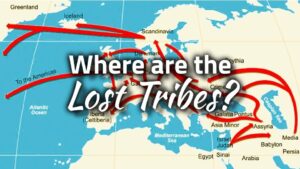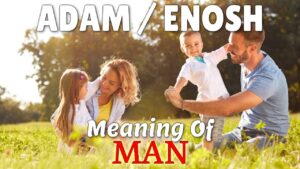Latest Posts
Ruth was NOT a Moabite
Ruth – Israelite or Moabite? Most Christians presume Ruth to be a racial Moabite, imagining the Old Testament story to be one about breaking God’s Law and then trying to picture Christ as a hypocrite with a corrupted genealogy. Today, we’re going to, and hopefully in a concise yet effective manner, defend Ruth and decisively prove her Israelite ancestry. This has been done before, but seldomly in an effective video format.
Overview of context of Ruth story
Ruth’s story is told in the book of the Old Testament which is dedicated to her, taking place during the time of the Judges. There is a famine in Judah, and for reason of the crisis, Elimelech and his wife Naomi travel to the land of Moab. There they have two sons, Mahlon and Chilon, who both marry women in the region, Orpah and Ruth. By the end of ten years, Elimelech, and his two sons, have passed away.
Her husband and two sons dead, and hearing that the famine in Judah has ended, Naomi plans to return to Judah. Orpah and Ruth are distraught and in a vulnerable state, because they have both been left alone without husbands, and now risk losing their mother in-law. Orpah leaves but Ruth decides to continue on with Naomi. In Judah she is introduced to Boaz, her late husband’s closest relative who is obligated to take her in, as per the law of kinsman redemption. However, Ruth learns from Boaz that she has an even closer relative who the obligation falls towards first.
Boaz confronts this man, but the individual rejects his responsibility as kinsman redeemer. Because the man refuses to take on Ruth, Boaz is next in line and he fulfills the law of kinsman redemption, and together the couple bear Obed, the father of Jesse, and Ruth becomes an ancestor of Christ.
Moab before Ruth
That is a summary of the story of Ruth, and now because the story of Ruth takes place in the Judges period, we should look at the history of Moab leading up until then. This will help us understand the conditions of the land during Ruth’s lifetime.
When the Israelites entered Canaan, they were instructed by Yahweh God to slay certain inhabitants of the land. The Moabites were one of these people, and one of the few where the Israelites actually followed the commandment which was given to them. Numbers 21 tells us that Sihon, the king of the Amorites, had taken all the land of Moab and the Moabites therein captive before the Israelites came in.
Then concerning Sihon, in Deuteronomy 2 we read: “Then Sihon came out against us, he and all his people, to fight at Jahaz. And Yahweh, our God delivered him before us: we smote him, and his sons and all his people. And we took all his cities at that time, and utterly destroyed the men and the women and the little ones, of every city: we left none to remain.”
The Israelites then went on to occupy the land of Moab, destroying both the Amorites and Moabites who had dwelt there, and there are enough verses relating to this that Bible teachers on the subject of Ruth have really no excuse for their ignorance. Here are some: Num. 21:25, 29, 31; 33-35; Deut. 2:32-34; Deut. 3:12-16; 23:3; Judg. 11:12-26; Zeph. 2:9; Isa. 25:10
Most of us know that the Israelites were famously given the commandments to destroy the Canaanites, and we see that the Moabites are one of the few instances where the Israelites devotedly followed the command. It is well known that later on, west across the Jordan, the Israelites had compromised and left many Canaanites alive, for which Yahweh God rebuked them. But as for the lands east of the Jordan, we see that the Israelites had indeed succeeded.
People called by area commonly
After the original inhabitants were destroyed or driven out, much of the land was then given to the tribes of Reuben, Gad and Mannaseh. We read this in Deuteronomy 3:12-16: “And this land which we possessed at that time, from Aroer which is by the river Arnon, and half mount Gilead and the cities thereof, gave I unto the Reubenites and to the Gadites. And the rest of Gilead, and all Bashan, being the kingdom of Og, gave I unto the half tribe of Manasseh. And unto the Reubenites and unto the Gadites I gave from Gilead even unto the river Arnon half the valley, and the border even unto the river Jabbok, which is the border of the children of Ammon.”
So the land of Moab, was then inhabited by the Reubenites, Gadites, and by a portion of the tribe of the Mannasites. Often in history, when the original inhabitants of a land are displaced, it is not uncommon for the newer inhabitants, for sake of convenience, to take on the older and still commonly known name of the land. The state of Alabama is named after the “Alabama”, a tribe of Native Americans who lived there previously, and now today someone who lives in Alabama is called an Alabaman. But common sense tells us that your typical Alabaman is not a Native American, but European, because we know the history of Alabama. If one is reading a story, and an Alabaman is mentioned, it is foolish to assume them to automatically be a Native American.
That same common sense tells us about the situation in the land of Moab during the time of Ruth. In her time and much like our own time now, many men identified themselves by geography rather than solely by their tribe. David and Saul were known by geographical names, though David was a Judahite and Saul was a Benjamite. In 2 Samuel 23 we see a list of some of David’s mightiest warriors, who are all named by geography.
Kinsman redemption
These events first started to take place circa 1450 BC, in the Judges period, and Ruth was alive during that time. In Judges 11:26, we see that by the time of Jephthah, the Israelites had possessed the land of Moab for 300 years. Now we have more more context surrounding the story, that a famine (Yahweh’s chastisement) had come upon the land of Judah, and so Elimelech had traveled across the Jordan to Moab, a place where many Reubenites, Gadites and Mannasittes dwelled.
It was explicitly forbidden in the Law for an Israelite to enter into marriage with a Moabite woman, as we read in Deuteronomy 23:3: “ An Ammonite or Moabite shall not enter into the congregation of the LORD; even to their tenth generation shall they not enter into the congregation of the LORD for ever.” This line is found only one line after the famous verse concerning the exclusion of bastards. Moabites themselves were bastards, as they could not trace their lineage purely back to any of Noah’s sons, having mixed with Canaanites at an earlier time. Any union with a Moabite woman would rear bastard offspring, and transgress the Law.
Now there is no doubt that Ruth and Orpah were ethnic Israelites dwelling in the land of Moab, most likely of the tribes of Reuben, Gad or Mannaseh, and this is why Elimelech’s sons had taken their hands in marriage. When Ruth travels back to Judah with Naomi, the law of kinsman redemption becomes of immediate importance for her. This law was in place so that when an Israelie man died, his nearest of kin would take his wife and take up seed for him, so that his name would not be lost in Israel. This also provided protection to widows, at a time when widows and the fatherless were some of the most vulnerable people in society.
The responsibility of kinsman redemption was a very serious one, and Ruth went to Boaz so that he could fulfill the role of kinsman redeemer, and Boaz even notes her righteousness in seeking him out. However, Boaz first mentions in his own act of goodness that there is one of nearer kin than he, and that he will first approach this man to see if he will take Ruth in.
Why did the kinsman redeemer loose his sandal?
There are two major signals here that Ruth was indeed an Israelite, the first being that kinsman redemption was even applicable to her. Boaz is a man of good character, following and respecting the Law of God and commending Ruth for her similar fervor. If she were a Moabite by race, and not by geography, then Boaz would have cast her away, citing the law which he clearly respects.
The second signal is even more significant, and that is when we see that this man of nearer kin, whom Boaz mentions, refuses to follow his obligation of being a kinsman redeemer, for he doesn’t want to share the inheritance with any woman or sons. The punishment of refusing to fulfill your obligation of kinsman redemption was a serious one, in Deuteronomy we read:
“5 If brethren dwell together, and one of them die, and have no child, the wife of the dead shall not marry without unto a stranger: her husband’s brother shall go in unto her, and take her to him to wife, and perform the duty of an husband’s brother unto her. {her husband’s…: or, her next kinsman} 6 And it shall be, that the firstborn which she beareth shall succeed in the name of his brother which is dead, that his name be not put out of Israel. 7 And if the man like not to take his brother’s wife, then let his brother’s wife go up to the gate unto the elders, and say, My husband’s brother refuseth to raise up unto his brother a name in Israel, he will not perform the duty of my husband’s brother. {brother’s: or, next kinsman’s} 8 Then the elders of his city shall call him, and speak unto him: and if he stand to it, and say, I like not to take her; 9 Then shall his brother’s wife come unto him in the presence of the elders, and loose his shoe from off his foot, and spit in his face, and shall answer and say, So shall it be done unto that man that will not build up his brother’s house. 10 And his name shall be called in Israel, The house of him that hath his shoe loosed.”
This man wanted the inheritance which the son of Elimelech had left behind, meaning his estate. He initially accepts to redeem the estate, but when he learns that the man had had a wife, he refuses, and the writer of Ruth informs us that this was because he did not want to share it with the inevitable children he would have been obligated to have borne with Ruth. He then looses his shoe before elders, in acceptance of his punishment according to this relatively obscure law.
If he was aware of this obscure law, then he also most certainly would have been aware of:
“ An Ammonite or Moabite shall not enter into the congregation of the LORD; even to their tenth generation shall they not enter into the congregation of the LORD for ever.”
Citing this would have allowed him to both avoid punishment and also to legally inherit his kin’s estate. A quick and easy solution, both giving him what he desires and saving his reputation at the same time. This Law was well known, and a man who is aware of Deuteronomy 25 would indeed be aware of the more important and significant Deuteronomy 23:2.
But he doesn’t cite it, and that’s because Ruth was an Israelite.
“Your God will be my God”
Ruth affirms it in her own words.
In the King James Version, we read Ruth tell Naomi in Ruth 1:16 “And Ruth said, Intreat me not to leave thee, or to return from following after thee: for whither thou goest, I will go; and where thou lodgest, I will lodge: thy people shall be my people, and thy God my God”
The words “shall be” are added in Italics, and are not in the original text of the Hebrew. Brenton also added “shall be” in his translation of the Septuagint, but neither is it found in the Greek there. This is because translation is always in part interpretation, and these men were adding words to the text to try to shape it into what they imagined it to be.
There is no future tense in the words of this passage here, not in the Hebrew of the Masoretic nor in the Greek of the Septuagintt. Ruth is not indicating anything to happen in the future, but is rather making a statement to Naomi. Ruth’s words read “your people my people and your God my God”: ὁ λαός σου λαός μου καὶ ὁ θεός σου θεός μου.
Some Bible translations do render the verse honestly, such as Young’s Literal Translation which reads:
“And Ruth saith, ‘Urge me not to leave thee — to turn back from after thee; for whither thou goest I go, and where thou lodgest I lodge; thy people is my people, and thy God my God.”
Not even the latin of the Vulgate has the words “shall be” or any future tense, where it reads only: “populus tuus populus meus et Deus tuus Deus meus”, which is again: “my people your people and my God your God”
Ruth is making a statement to Naomi that she will return with her to Judah, because they share the same people and the same God. God here is Elohim and may also be read “judges”, and since Ruth takes place during the time of Judges, this also could be an applicable rendering.
An admirable example
At the end of the book of Ruth, we see that Ruth is celebrated for her righteousness and compared to women who came before her, like Rachel, Leah, and Tamar. She is also spoken of as being part of building a house, much like Rachel and Leah bearing a significant portion of the twelve sons who formed the tribes of Israel, and Tamar gave us the houses of Pharez and Zerah. This is prophetic, with Ruth being a grandmother of David, lending her hand toward the house of David and ultimate seat of Christ.
These honors could never be given to a bastard. Jacob traveled to Padanaram to find wives of his own kin, and there he found Rachel and Leah. Tamar went to great lengths to assure that the seed of Judah would be preserved, and being upright she is remembered as a righteous woman. Ruth, like Tamar, also fought hard to preserve the seed of Israel, and for this she should be remembered admirably.
It is very important that Ruth is read correctly. If Ruth was a Moabite by race, then all of her descendants would have been bastards, and Christ would have been illegitimate. Many elements of scripture stand as a test. Will men believe in a God who follows His own Law, or will they cling to Pharisaism? The Ruth story can either be interpreted fancifully, that the Law of God was broken that day, that David was a bastard, and that God Himself breaks His own Law. Or it can be read honestly, with the proper context and reasoning.
God cannot break His own Law, even dying to show the extent to which He will go in order to keep it. Ruth was an Israelite by race, and an example of a righteous woman who went to great lengths to fulfill the Law of God. One day will soon come, where no one will slander Ruth, or any of those recorded in our Bibles who did righteous things in this life.
Thank you for watching, praise Yahweh, the God of Israel. Yahweh Bless.
.








